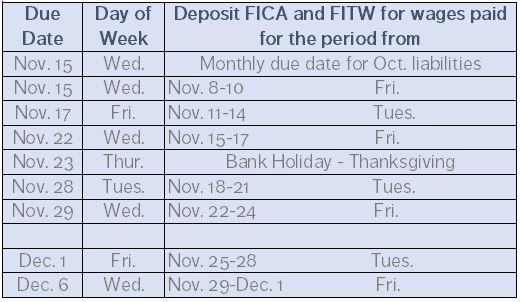Tax Season is Coming: Dates to Watch For
For business owners, tax season can be quite daunting. Don’t get lost in the deadlines and due dates! The American Institute of Professional Bookkeepers has released a Tax Calendar and a list of Payroll due dates all businesses should be mindful of in the coming months. Below is a helpful guide to refer to when keeping your business organized this tax season.
Tax Calendar

American Institute of Professional Bookkeepers
It is important to remember:
The only acceptable reason for delaying deposit of payroll taxes due is a legal federal holiday
Deposits of $100,000 or more must be made within one business day of the day that the tax liability is incurred.
Year-End 2017 Due Dates
BEFORE DECEMBER 1, 2017
- Remind employees on or before this date if that if there has been a change in their filing status due to marriage, divorce, or dependents (birth, adoption, child turning 21), they may want to file a new W-4 for 2018
- Make sure employee paycheck names and SSNs match their SS cards and W-4 data. Consider using the SSA’s SSN Verification Service.
- Employers can elect to use the Special Accounting Rule and treat employee personal use of a company-provided vehicle in November and December as “paid” in 2018.
BY DECEMBER 31, 2017
- For tax purposes, wages paid by check or electronically after this date are generally 2018 wages, even if earned in 2017.
- Check all SS withheld. If any employee paid more than the 2017 limit of $7,886.40, make an adjustment or refund before making your final tax-year 2017 deposit. Leave enough time to make adjustments and refunds.
- Regardless of whether you use a payroll service, verify that all special wage payments and adjustments are correctly posted to 2017 earnings before processing 2017 W-2s, including:
- taxable relocation expense reimbursements;
- group-term life insurance in excess of $50,000;
- third-party sick pay;
- manual or voided paychecks not in your system;
- personal use of company vehicles, taxable parking and/or company-provided transportation;
- employer-paid child care above the annual limit;
- company-paid taxable educational assistance;
- taxable noncash payments; and
- other taxable items paid outside of the payroll system.
- Report 2017 pay on 2017 W-2s, provided that the employee had access to the wages without substantial limitation or restriction.
- Remember, even if a paycheck is dated 2018, if the employee had access to it in 2017, include the wages and taxes on the 2017 W-2.
**Information in this article was provided by the American Institute of Professional Bookkeepers and Tax Notes Today (November Article)
